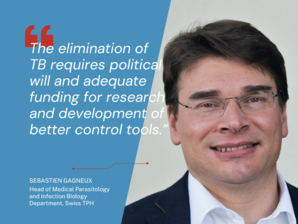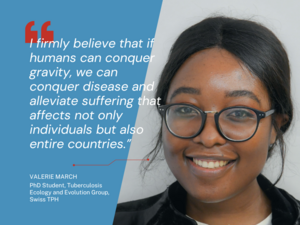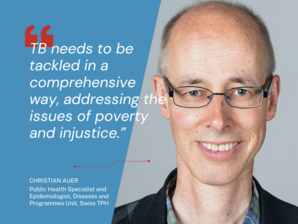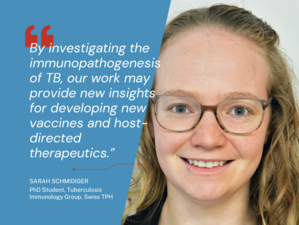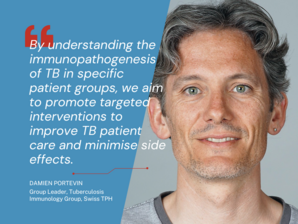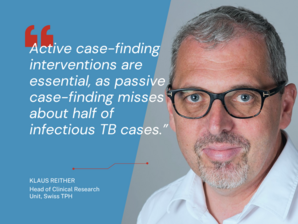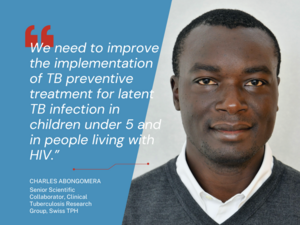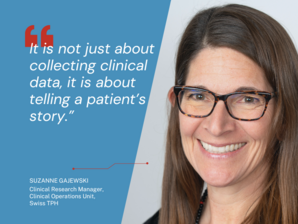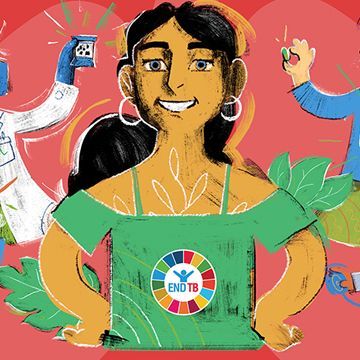

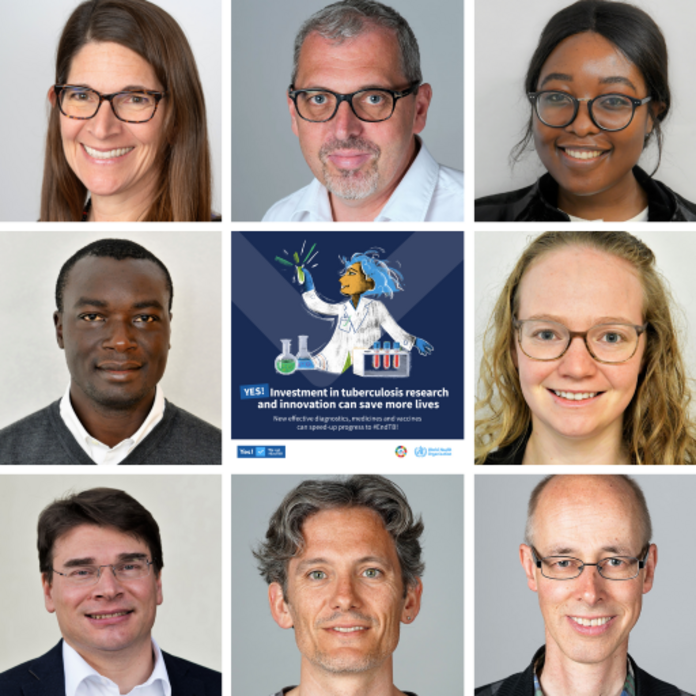
To mark World TB Day 2023, we spoke to some of our experts here at Swiss TPH about their work on tuberculosis (TB), the highlights and impact of their research, why they are committed to TB, and what they think is needed to tackle TB as a public health problem.
Sebastien Gagneux
"I chose to focus my research on TB because it has been one of the world’s most important infectious diseases for thousands of years and still is today. We study the diversity of TB bacteria around the world and how these bacteria evolve in patients during treatment and when they transmit from patient to patient. Through our work, we hope to gain a better understanding of why and how TB bacteria develop resistance to antibiotics.
A particular highlight of my research was the finding that prisons can be a breeding ground for highly drug-resistant TB, which can then spread into the general population.
The elimination of TB requires political will to tackle the disease (as demonstrated for COVID-19) and adequate funding for research and development of better control tools, especially vaccines."
Sebastien Gagneux is Head of the Medical Parasitology and Infection Biology Department. His research focuses on the ecology and evolution of Mycobacterium tuberculosis, with particular emphasis on antimicrobial resistance.
Valerie March
"My thesis project aims to understand the within-host evolution of Mycobacterium tuberculosis. We want to understand the evolutionary trajectories that occur in the TB bacteria that contribute to treatment failure; this includes how they develop drug resistance as well as any other mechanisms that allow bacteria to survive antibiotic treatment.
I wanted to pursue a scientific career in a field relevant to human health because I firmly believe that if humans can conquer gravity, we can conquer disease and alleviate suffering that affects not only individuals but also entire countries. I was on track to start a career in cancer research when I got an interview for my current position, and it was a no-brainer. I am a South African; I come from a place with a high TB burden, so I jumped at the opportunity to make a contribution that could benefit the country that raised me.
One truth I can’t shake when I get lost in the complexities of genetic interactions and bacterial phenotypes, is that Europe managed to almost eradicate TB without all the sophisticated machinery and antibiotic regimens available today. Ultimately, I believe that properly funded and managed public health campaigns, including poverty alleviation, would make a world of difference to TB epidemiology."
Valerie March is a PhD student in the Tuberculosis Ecology and Evolution Unit.
Christian Auer
"I started working on TB in 1997. Currently, a health economist from the Swiss Centre for International Health (SCIH) and I are developing an economic model to show countries how much money they can save by using the latest regimens to treat drug-resistant TB instead of the regimens currently used. I am also heavily involved in the preparations for the TB Symposium.
Through my work, I want to help ensure that TB care uses the best available tools, based on the latest evidence. And that the ‘TB world’ recognises that TB must be tackled comprehensively, in a way that also addresses issues such as poverty and injustice. TB is a highly neglected disease that mainly affects the poor. I lived for seven years in poor urban areas of Manila, Philippines, and had neighbours who got TB and some who died of TB. So, it has a personal touch. Because I believe that as human beings we have a responsibility to our neighbours, especially those trapped in poverty, the issue of TB and TB care is very close to my heart.
A highlight of my work was the time I spent in Manila working with a Philippine foundation to advance the treatment of drug-resistant TB. And the more recent work at Swiss TPH for UNITAID, where we examined various clinical trials of TB drugs.
In my view, there are three key aspects to eliminating TB as a public health problem:
1) TB care: the latest, best available tools need to be made available to EVERYONE.
2) Current diagnostic tools and drugs, as well as the only TB vaccine in use (BCG), are clearly suboptimal. More support and capacity for basic and applied research, including rapid clinical trials, is needed.
3) Because TB is so closely linked to poverty, TB care must include poverty alleviation. Working for better TB care means working to reduce poverty and unjust structures."
Christian Auer is a Public Health Specialist and Epidemiologist in the Diseases and Programmes Unit of the Swiss Centre for International Health at Swiss TPH with a focus on the control of TB and multidrug-resistant TB.
Sarah Schmidiger
"Our research group studies human immune responses to Mycobacterium tuberculosis (Mtb) infections. In this context, my PhD project aims to understand what protective immunity against Mtb entails. We use a three-dimensional in vitro granuloma model and a unique collection of clinical specimens to reproduce and dissect Mtb-induced granulomatous responses ex vivo.
In the long term, I hope that our research will contribute to reducing the global burden of TB. By increasing our understanding of the immuno-pathogenesis of TB, our work may provide new insights for the development of new vaccines and/or host-directed therapeutics. At the very least, I hope to help raise awareness of this often forgotten pandemic.
Immunology and tropical diseases have always fascinated me, but I came to TB research by chance during my master's here at Swiss TPH. I joined the TB immunology group for my thesis, not realising that I had found the perfect combination of my scientific interests. I was hooked on the science and loved the working environment, so when the opportunity arose to stay on for a PhD, it was a very easy choice. :)
I really like working in our Biosafety Level 3 (BSL3) laboratory. BSL3 work requires a lot of concentration, but is also strangely calming: every move is dictated, carefully thought out in advance. Working with the ‘real bug’ and clinical specimens makes our research much more relevant and translational, which I find highly motivating."
Sarah Schmidiger is a PhD student in the Tuberculosis Immunology Group at Swiss TPH.
Damien Portevin
"The bacteria responsible for TB hijack immune cells to replicate and promote lung lesions, supporting symptoms and transmission through the generation of infectious airborne droplets. My research aims to use ex vivo models to disentangle the multi-factorial interplays between human immunity and TB pathogenesis to provide the basis for new interventions, from immuno-diagnostics to host-directed therapies. On the one hand, our work supports the development of innovative diagnostic methods to detect paucibacillary or extrapulmonary forms of TB. On the other hand, by improving our understanding of the immunopathogenesis of TB in specific patient groups, we aim to promote targeted interventions to shorten or adapt the treatment of TB patients to minimise side effects and post-TB sequelae.
TB is a very unfair infectious disease because it tends to affect the most deprived and poorest strata of our societies around the world. I find it very motivating to try to make a scientific contribution to tackling it. Most recently, through multiple collaborative efforts with our Tanzanian partners, we have demonstrated that a dedicated blood-based test has the potential to save children's lives by accurately diagnosing TB within 24 hours from a single millilitre of blood.
To eradicate TB, we would need preventive tools, including an effective vaccine, and these would be most likely achieved if global awareness and financial investment were at the level of the COVID-19 pandemic."
Damien Portevin leads the Tuberculosis Immunology Group at Swiss TPH, which focuses on understanding the complex host-pathogen interaction in tuberculosis, with a particular emphasis on human immunity to tuberculosis.
Klaus Reither
"My team and I work in clinical tuberculosis research, especially in low-resource settings. Our research focuses on the epidemiology of TB and the development and evaluation of new treatments, drugs and diagnostics. TB is one of the biggest health problems of our time, and we hope that our research will help put an end to this disease. My personal motivation to focus on TB stems from having worked in Africa for several years, where I saw on a daily basis the magnitude of the TB problem, both for individuals and affected communities.
Our current research focus is on detecting TB in affected communities through active case-finding strategies. These interventions are expensive and time-consuming, but essential, as passive case finding misses about half of infectious TB cases. Technological innovations, such as X-ray image analysis software or portable X-ray machines, are making the work easier, but this work can only be successful if it is carried out in the context of the society concerned.
We need international awareness and political commitment, as was the case with the COVID-19 pandemic in many parts of the world. Of course, this also means much more funding for disease control and research. TB is again killing more people than COVID-19, but the global response to the problem of poverty-related TB remains shameful."
Klaus Reither heads the Clinical Research Unit at Swiss TPH. His research focuses on clinical tuberculosis, particularly new drugs, vaccines and diagnostics.
Charles Abongomera
"I am a Senior Scientific Collaborator in the TB-CAPT consortium. TB-CAPT includes a series of clinical trials in Tanzania, Mozambique and South Africa that will evaluate the impact of novel diagnostic interventions on outcomes, including the effects of expanding TB testing strategies to HIV-positive people. The trials will compare new strategies with current standards of care, taking into account local epidemiology and existing infrastructure.
I am developing new research projects to improve the implementation of TB preventive treatment for latent TB infection in children aged under five years and in people living with HIV in low- and middle-income countries (LMICs).
What impact do I hope to make through my work?
- Improve TB diagnostics and implementation of TB preventive treatment for latent TB infection in children aged under five years and people living with HIV in LMICs.
- Contribute to the reduction of TB-related morbidity and mortality
- Contribute to the achievement of the Sustainable Development Goals and the World Health Organization’s End TB Strategy.
TB remains a leading cause of illness and death worldwide, especially in low- and middle-income countries.
Therefore, high-quality research is urgently needed to provide evidence-based information that can help to reduce TB-related morbidity and mortality."
Charles Abongomera is a Senior Scientific Collaborator in the Clinical TB Research Group at Swiss TPH with a research focus on diagnostic development.
Suzanne Gajewski
"For the past 6 years, I have provided clinical monitoring and operational support for the Médecins Sans Frontières-sponsored Phase II / III clinical trial TB-Practecal. The trial compared 6-month regimens containing Bedaquiline, Pretomanid and Linezolid with the standard treatment for multidrug-resistant (MDR) TB. Monitoring ensures that a study is conducted in an ethical manner that protects the rights and safety of participants, and that the data collected are accurate and reliable. The Clinical Operations Unit is currently involved in other TB research studies such as TB Triage+ and DRTB-HDT (Stratified Host-Directed Therapy for Rifampicin-Resistant TB).
By providing operational support for clinical research studies, my aim is to help deliver high quality evidence to regulators and governing bodies, in order to bring safe and effective treatments to the patients.
However, generating this quality evidence requires rigorous study conduct and meticulous documentation, which can be burdensome for research teams. When the workload becomes overwhelming, I think it is important to take a step back and remember that the data collected reflects the story of each volunteer participant. Every story should be presented accurately. It is not just about collecting data, it is about telling a patient’s story. TB-Practecal was a success story in that the data generated led to the WHO recommendation to implement the 6-month, all-oral regimens BPaLM (Bedaquiline+Pretomanid+Linezolid+Moxifloxicin) and BPaL (Bedaquiline+Pretomanid+Linezolid) for the treatment of multidrug-resistant TB. This is the kind of impact we strive for!"
Suzanne Gajewski is a Clinical Research Manager in the Clinical Operations Unit at Swiss TPH.
